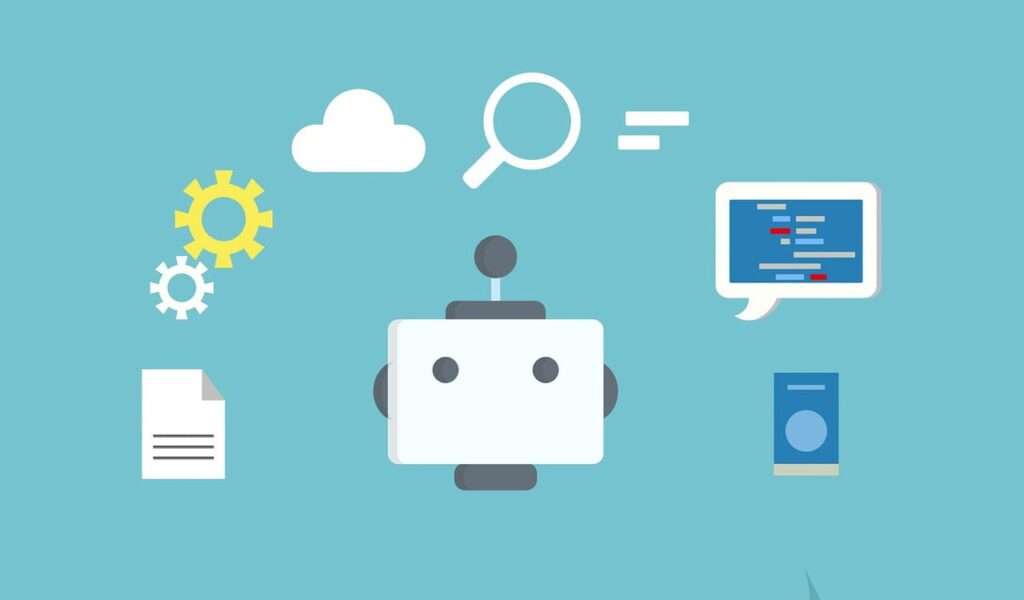The fast use of Artificial Intelligence (AI) has significantly impacted current technology. The enormous effects of AI on numerous facets of contemporary technology, from machine learning and automation to natural language processing and computer vision, are explored in this blog article. We can fully appreciate AI’s transformational potential by comprehending its uses and advantages and the ethical issues and difficulties it raises.
AI Applications in Modern Technology

Machine Learning (ML):
Machine learning is a branch of artificial intelligence that allows computers to learn from data without explicit programming. It enables algorithms to analyze enormous volumes of data, spot patterns, and come to conclusions or predictions. Machine learning has several uses, from e-commerce recommendation systems to healthcare predictive analytics.
Automation:
Automation entails using robotics and AI to automate operations and minimize human involvement. AI-powered automation can quickly and accurately perform tedious and repetitive jobs, freeing human resources with difficulty and imaginative work. Through automation, sectors, including manufacturing, shipping, and customer service, have seen notable productivity benefits.
Natural Language Processing (NLP):
NLP allows computers to comprehend, decipher, and produce human language. Chatbots, voice assistants, and language translation services are examples of applications that use AI algorithms to interpret and analyze text or audio input. Information retrieval, language-based analytics, and customer service interactions have all changed by NLP.
Vision in computers:
Machines can understand and analyze visual data using computer vision, simulating human visual perception. AI systems can identify items, people, gestures, and even emotions in movies. Applications for computer vision include facial identification, driverless cars, surveillance systems, and industrial quality control.
The Effects of AI on Different Industries:
Healthcare:
AI is revolutionizing healthcare by aiding diagnosis, treatment, and personalized therapy. Machine learning algorithms examine medical data to find trends, identify illnesses early, and recommend the best possible course of treatment. AI-powered solutions can also remotely monitor patients, expanding access to healthcare and improving patient outcomes.
Finance:
AI has several advantages for the financial sector. AI systems may analyze large volumes of economic data to spot fraud, find abnormalities, and improve risk assessment. AI-powered trading algorithms can quickly and accurately interpret market movements and place trades. Additionally, consumers may get tailored financial advice via AI-powered virtual assistants.
Transportation:
AI is stirring transportation with improved autonomous driving, traffic control, and route optimization. AI-based technology is used in self-driving vehicles, trucks, and drones to traverse highways, increase safety, and improve transportation effectiveness. AI systems analyze real-time traffic data to optimize routes, ease traffic, and reduce travel time.
Retail:
AI has transformed retail by providing customized suggestions, inventory control, and customer service. AI systems analyze client data to provide personalized product suggestions, increasing customer happiness and boosting sales. AI-powered inventory management solutions optimize stock levels, cutting waste and boosting supply chain effectiveness.
Benefits and Advantages of AI for Modern Technology
Enhanced Productivity and Efficiency:
AI-driven automation decreases human error, speeds up procedures, and improves effectiveness. Automating repetitive processes frees up human resources for more challenging and innovative work. Businesses benefit from higher productivity and lower costs as a result.
Improvements in Decision-Making
Large-scale data processing, pattern recognition, and data-driven decision-making are all capabilities of AI algorithms. Businesses can do this to improve operations, create more accurate predictions, and gather vital information for making strategic decisions.
Personalized Experiences:
Businesses may provide clients with personalized experiences thanks to AI. Recommendation systems use AI algorithms to analyze client preferences and behavior and provide customized product recommendations and marketing campaigns. Virtual assistants and chatbots offer 24/7 personalized customer service and support.
Innovation and revolutionary developments:
By pushing the frontiers of technology, AI fosters creativity. It creates fresh opportunities for tackling challenging issues, developing inventive solutions, and sparking revolutionary developments. AI technologies can revolutionize whole sectors and open up new economic opportunities.
AI in Modern Technology: Ethical Issues and Challenges
Data security and privacy:
AI relies on enormous volumes of personal data, which raises questions regarding data security and privacy. Setting up strong data protection policies and ensuring data usage is transparent is essential.
Job Substitution:
Concerns regarding job displacements increased as automation with AI technology adopts. To address the impact on employment, it may become necessary to reskill workers in some occupations that can be automated.
Fairness and bias:
Biases existing in the training data may unintentionally manifest in AI systems, producing unjust results. It is crucial to ensure fairness and correct biases in AI algorithms to avoid discriminatory practices in fields like recruiting, lending, and criminal justice.
Transparency and accountability:
Developers and companies employing AI technology are accountable for their products. Clear accountability and transparent AI development methods are required to guarantee AI’s responsible and ethical use.
Future Implications and Potential of Artificial Intelligence in Modern Technology
Forecasts for the Future:
The pace of AI’s incorporation into modern technology will increase in the next five years. The promise of AI is in several sectors, including industry, healthcare, finance, and education. It can spur more upheaval and innovation, influencing the direction of technology.
Rules and Guidelines for Ethical Behaviour:
Establishing ethical standards and laws is essential as AI develops. Clear ethical frameworks may direct AI creation, use, and deployment, ensuring that technology continues to be helpful and consistent with society’s ideals.
AI and Human Collaboration:
Collaboration between humans and AI will be essential to realize AI’s potential. Even though AI can automate processes and offer insights, human creativity, skepticism, and morality are still necessary to direct AI’s application and solve complicated issues.
Conclusion
Artificial intelligence has had a significant influence on contemporary technology, reshaping whole sectors as well as how people live and work. Its uses in automation, computer vision, natural language processing, and machine learning have opened the way for better decision-making, enhanced productivity, and personalized experiences. We can harness AI’s revolutionary capacity to create a better future by balancing technical development and moral principles.
Thanks for reading this article till the end. Please use the comment section if you want to share more thoughts on AI impact or leave feedback on this article.
